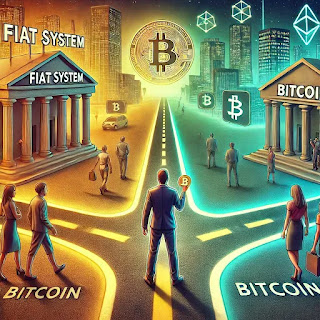Bitcoin as the Great Equalizer
Picture this: a Roman soldier counting his denarius, a farmer in Zimbabwe clutching trillion-dollar notes that buy almost nothing, and a coder in San Francisco watching their paycheck shrink under inflation. Three people, three eras, three worlds apart, yet all bound by the same truth: scarcity. Scarcity is the common denominator of human life. What changes is how societies manage it. For centuries, rulers and central banks have manipulated money, tilting the game in their favor. Bitcoin changes this. It does not just challenge the old order, it levels the field.
Scarcity Through History: From Denarius to Dollars
Scarcity has always been with us, but so has the temptation to cheat it. Roman emperors shaved silver out of coins until soldiers were paid in metal disks worth less each year. In Zimbabwe, runaway money-printing left farmers holding currency that burned faster than firewood. Today, coders in Silicon Valley may earn six-figure salaries, but even they cannot outrun rent and inflation eating away at their efforts. The story is timeless: centralized money bends reality until it breaks ordinary people.
Bitcoin as Digital Scarcity
Bitcoin reintroduces fairness by encoding scarcity into math itself. Twenty-one million coins, not one more. No emperor, no banker, no politician can rewrite the ledger. Unlike gold, Bitcoin is weightless and borderless, scarcity without the limitations of geography. It is the first monetary system where rules cannot be bent, bribed, or broken. This digital scarcity speaks the same truth in San Francisco as it does in Harare or Rome.
Collapsing the Divide Between Rich and Poor
The fiat world builds walls: bank accounts with minimum balances, investment products for the wealthy, gatekeepers at every level. Bitcoin tears those walls down. A smartphone and internet connection are enough to step into a global monetary network. A hedge fund manager in New York and a farmer in Kenya can both acquire the same scarce asset. There are no “VIP” Bitcoins, just sats, divisible down to the hundred millionth. For the first time, the poor and the rich sit at the same monetary table.
Remittances prove this every day: workers abroad sending sats home, bypassing predatory fees. Villagers in places without banks leapfrog directly to digital money, stacking satoshis as easily as texting. In a world of endless inequality, Bitcoin offers a crack in the wall, an open door to financial sovereignty.
Collapsing the Divide Between Nations
For centuries, the developed world had the edge: robust banking systems, stable currencies, deep capital markets. The developing world was left out, forced into fragile economies and dependent on foreign currencies. Bitcoin ignores borders. It does not care if you are in Nigeria or Norway. It treats all transactions with the same neutrality.
That is why adoption often starts from the edges. Nigerians use Bitcoin to escape a collapsing naira. Argentinians use it to survive triple-digit inflation. Lebanon turns to sats as their banking system disintegrates. And then there is El Salvador, planting the flag by declaring Bitcoin legal tender. The message is clear: the global money game is changing, and Bitcoin does not ask permission.
Collapsing the Divide Between Generations
Fiat systems quietly pit generations against one another. Boomers hold assets that inflate in value, while Millennials and Gen Z inherit debts, inflated tuition, and stagnant wages. Saving feels impossible because fiat is designed to leak value. Bitcoin flips that script. It gives the younger generations a tool to save, to invest, to believe that time works in their favor again.
A sat stacked today may outpace tomorrow’s inflation, giving a 20-year-old saver the same advantage once reserved for those already sitting on wealth. In Bitcoin, time preference reverses. Patience is rewarded. The next generation can finally plant financial seeds without worrying the soil will be poisoned by inflation.
The Great Equalizer in Action
Bitcoin is not utopia. It does not erase inequality overnight or solve every social ill. But it does something extraordinary: it removes the rigged monetary advantage. It offers a shield against corrupt governments, an alternative when banks fail, a foundation when currencies crumble. Soldiers, farmers, coders, and everyone in between suddenly have access to the same incorruptible base layer of money. That has never happened before in human history.
Conclusion: Scarcity, Fairness, and the Future
Scarcity is humanity’s shared truth, but for centuries it has been twisted to serve the few. Bitcoin restores it. By hard-coding scarcity into an open, borderless, and incorruptible system, it collapses divides between rich and poor, developed and developing, young and old. Bitcoin does not erase human struggle, but it does level the ground we all walk on.
The Roman soldier, the Zimbabwean farmer, the San Francisco coder, they are no longer separated by systems designed to exploit them. They are united under the same rule: 21 million, tick tock, next block.




Comments
Post a Comment